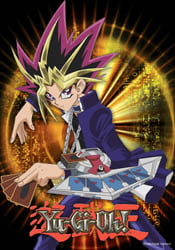Raise your brands
4Kids distribution chief Brian Lacey, who brought animé brand Pokemon to the international market, tells Jesse Whittock only truly popular children’s brands will survive in the digital era.

Brian Lacey
There’s a line of thinking that franchises and brands are ugly concepts, especially when it comes to children’s entertainment. But according to Brian Lacey, VP of international at New York-based distributor 4Kids Entertainment, only franchises and brands will thrive in the kids’ space in the era of streaming TV and video-on-demand.
“One of the challenges we all face in the business is the erosion of television audiences and fragmentation of the market. If you’re fortunate enough to produce or distribute content that either has the potential to become a brand, or already is a brand, that’s gold; really precious material,” he says.

Yu-Gi-Oh!
Only children’s franchises like Pokemon, SpongeBob SquarePants and Power Rangers – “the really big-name brands” – truly provide value for increasingly powerful platforms like Netflix and Hulu, and by extension, the distributors and producers that make and sell them, Lacey argues. “Essential to the success of building a brand is not just relying on television. You have to be across all platforms, and then you have the opportunity to grow a brand.”
Children’s content is “attractive” to Netflix and its ilk as children are “heavy repeat users,” but Lacey warns digital deals are currently no better than the home video and DVD ones that preceded them. “It’s not a case of new dollars, it’s a case of different dollars” – at least for now.
“Fifteen or 20 years ago, if you had a property that was on a major US network, the BBC or ITV, you could count on a home entertainment deal as a solid revenue stream and dollars would flow from that. Today, just because you’re on Cartoon Network or Nickelodeon it does not mean you’re going to get a home video deal.”
In the future, he can see the Power Rangers and Pokemons of this world achieving returns that “will ultimately equal and may surpass home entertainment revenues,” but as things stand, the digital business remains at a formative stage.
Lacey’s views are shaped by the course of his long career in children’s entertainment. Having worked on more than 3,000 episodes of shows such as Voltron: Defender of the Universe and Teenage Mutant Ninja Turtles, his biggest success was bringing Pokemon to the global market.
Lacey joined 4Kids in 2003 and oversaw a period of growth through another boys-skewing Japanimation brand Yu-Gi-Oh!. The company saw strong revenues thanks to stable TV, home entertainment, trading card, and licensing and merchandising businesses.
But in 2009 the economy and loss of two branded blocks on US network Fox forced the company to cut 15% of its staff and de-list from the New York Stock Exchange. It later closed its trading card and online gaming divisions and last year CEO Al Kahn retired after a quarter of a century in the business.
The low point came when the Japanese partners on Yu-Gi-Oh!, Asatsu-DK (ADK) and TV Tokyo Corp, sued for damages, claiming breaches to the franchise’s licence agreement. 4Kids was forced into Chapter 11 bankruptcy protection as it prepared for the court case and trading effectively stopped, all thanks to the show Lacey calls “the heart and soul of our business.”
But at the hearing in January, 4Kids was cleared of wrong-doing, with “99%” of ADK and TV Tokyo’s claims rejected as “meritless” by a judge. The pair were also found to have incorrectly cancelled the Yu-Gi-Oh! agreement and 4Kids regained its property.
Then, in March, 4Kids reached a settlement and agreed with the Japanese consortium to continue to work together on the property and no blame was apportioned to any party. A month later it was announced that KidsCo Media Ventures, a Delaware-based outfit affiliated with Saban Capital Group, was set to buy the Yu-Gi-Oh! brand from 4Kids for US$10m.
“What we have to do now is return to the core business,” says Lacey. But after everything that’s happened at 4Kids some kind of restructure seems inevitable. Lacey says the key is remaining focused on existing business and sourcing new content for CW4Kids, its Saturday morning programming block on US net The CW.
Elsewhere, 4Kids and Canada’s Breakthrough Entertainment are still developing Rocket Monkeys, which was first unveiled four years ago, and Lacey remains optimistic.
“The magic of the kids’ business is there’s no one location for the next hit. It can come from anywhere. If you look at the last 25 to 30 years, the big hits have come from the independents, not necessarily from the studios – I’m talking Teenage Mutant Ninja Turtles, Power Rangers, Yu-Gi-Oh! and SpongeBob. Nobody has a lock on creativity, and that’s what makes the business exciting and magical.”













.jpg)




























